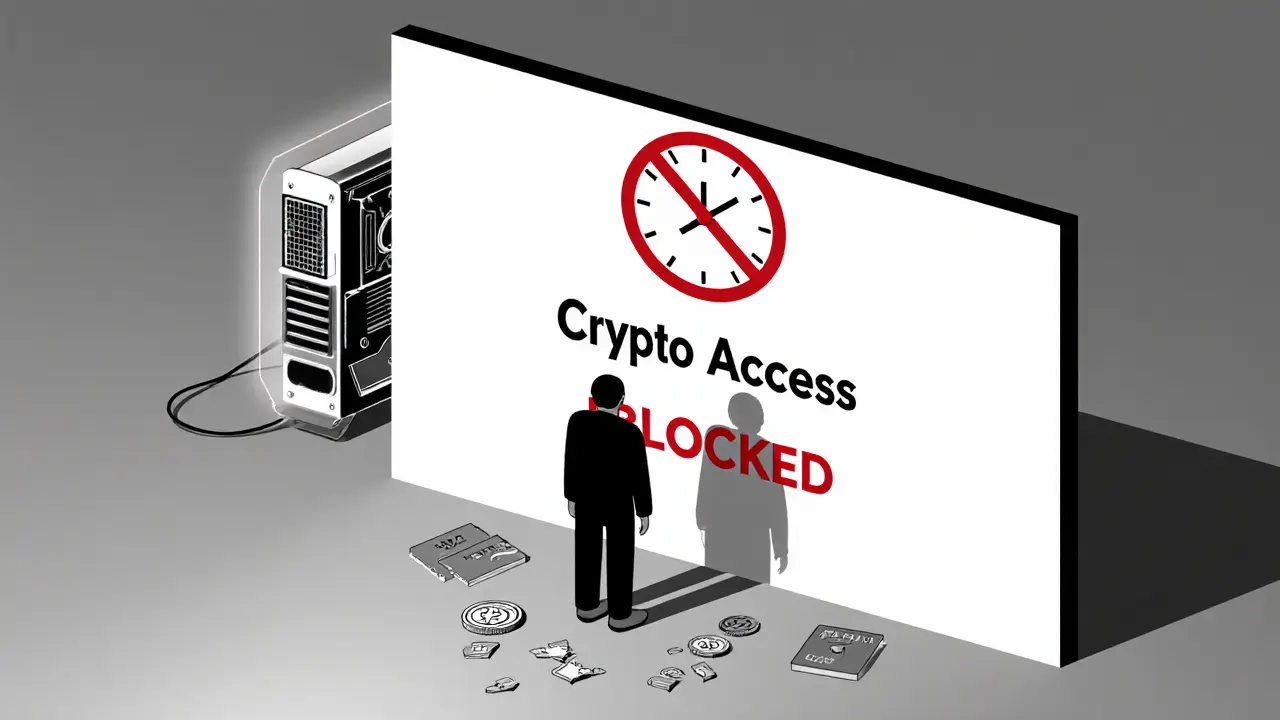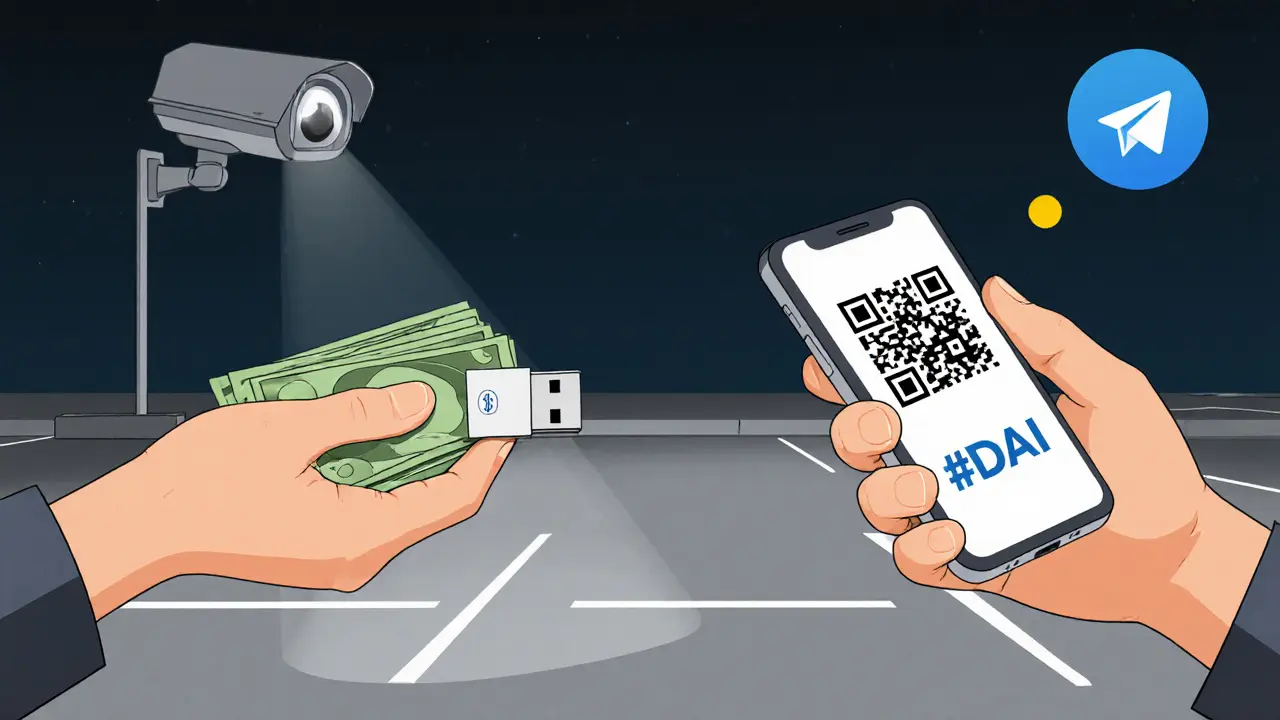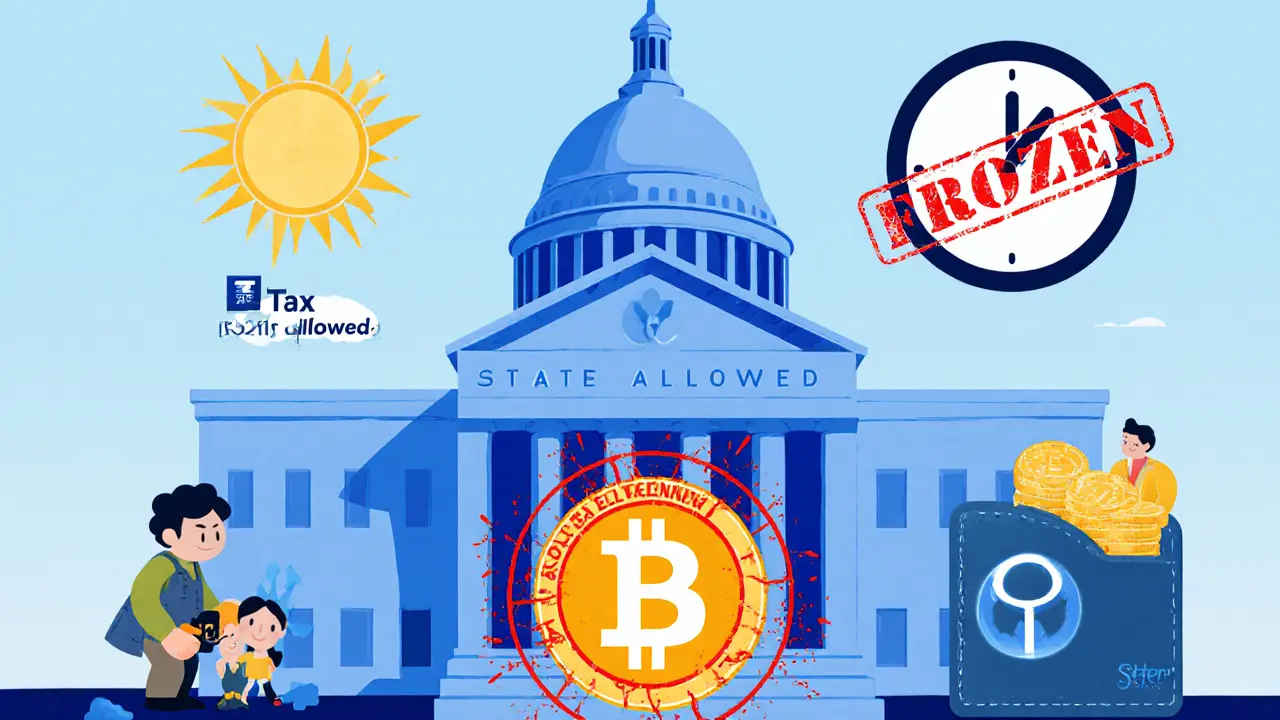Crypto Exchange Restrictions for Iranian Citizens in 2025: What You Need to Know
 Nov, 14 2025
Nov, 14 2025
Iran Crypto Tax Calculator 2025
Calculate your estimated tax liability for crypto profits under Iran's August 2025 crypto taxation law. Note: Actual rates may vary based on specific circumstances and future regulations.
Estimated Tax Liability
Note: Exchanges are required to report user data to tax authorities. Failure to report may result in penalties or legal action.
Iranian citizens can’t trade crypto like they used to. In 2025, the rules changed overnight. What was once a workaround for inflation and sanctions has become a high-risk activity under heavy government control. If you’re in Iran and trying to use Bitcoin, Ethereum, or USDT, you’re navigating a system designed to limit your access - not protect you.
Payment Gateways Shut Down
In January 2025, the Central Bank of Iran cut off all rial payment channels for local crypto exchanges. That meant you couldn’t deposit or withdraw Iranian rials to buy or sell crypto. It didn’t make crypto illegal - it just made it nearly impossible to use it like money. Banks stopped processing transactions to exchanges like Nobitex, Binance Iran, and others. People who relied on crypto to protect their savings from hyperinflation suddenly found their accounts frozen or locked out.
Why? The government said it was about taxes. Crypto exchanges had handled billions in trades over the past few years, but operators weren’t reporting income or paying taxes. The state wanted control - not just oversight, but full command. Now, every exchange must be licensed, submit financial records, and follow strict reporting rules. Unlicensed platforms? They’re offline.
The Nobitex Hack Changed Everything
On June 18, 2025, Nobitex - Iran’s biggest exchange with over 11 million users - was hacked. Attackers stole more than $90 million. The breach wasn’t just a technical failure; it was a political event. Within hours, the Central Bank announced new trading hours: exchanges could only operate between 10:00 AM and 8:00 PM local time. Outside those hours, all trading platforms were blocked.
This wasn’t about security. It was about control. The government wanted to limit when people could move money. By restricting access to just 14 hours a day, they made it harder for users to react quickly to price swings or move funds out of the country. Overnight, traders had to plan their moves like clockwork. Miss the window? You’re stuck until the next morning.
USDT prices in Iran jumped to over 12,000 tomans - far above the global rate - because people were desperate to hold something stable. The hack didn’t just steal money. It shattered trust.
Tether Freezes Iranian Wallets
Just weeks after the Nobitex hack, Tether took action. On July 2, 2025, they froze 42 cryptocurrency addresses linked to Iranian users. Most of these wallets had ties to Nobitex. Others were flagged by Israeli counter-terror finance units as connected to the Islamic Revolutionary Guard Corps (IRGC).
It wasn’t just about bad actors. Many ordinary Iranians had USDT in their wallets because it was the only way to preserve value. Now, their funds were locked. No appeal. No explanation. Just silence.
That forced a shift. Users started moving to DAI, a stablecoin built on the Polygon network. DAI isn’t controlled by Tether. It’s decentralized. It’s harder to freeze. Crypto influencers in Iran began posting step-by-step guides: how to swap USDT for DAI, how to use decentralized exchanges like SushiSwap, how to avoid the new restrictions. It wasn’t legal. But it was survival.

Now, You Pay Taxes on Crypto
In August 2025, Iran passed its first law taxing cryptocurrency profits. The Law on Taxation of Speculation and Profiteering put crypto in the same category as gold, real estate, and foreign currency trading. If you made money trading Bitcoin or Ethereum, you owe taxes.
The government didn’t just want to stop crypto. They wanted to profit from it. The tax system is still being rolled out, but early reports show that exchanges are now required to report user trading volumes to tax authorities. If you traded $10,000 in crypto last year and made a $3,000 profit? You’ll need to declare it. Failure to report could mean fines, asset seizures, or even criminal charges.
This move confused many users. If crypto is so dangerous, why tax it? The answer is simple: the state wants to control the flow - and take a cut. It’s not about banning crypto. It’s about owning it.
U.S. Sanctions Hit Shadow Banking Networks
Meanwhile, international pressure kept building. In September 2025, the U.S. Treasury’s Office of Foreign Assets Control (OFAC) sanctioned a $600 million Iranian shadow banking network. This wasn’t just about individuals. It targeted a web of front companies, digital wallets, and intermediaries that used crypto to launder oil money for Iran’s military.
One name stood out: Arash Estaki Alivand. His Ethereum and Tron wallets were frozen. But here’s the catch - these same wallets were used by ordinary Iranians to receive remittances or trade crypto. When the U.S. blacklisted them, it didn’t distinguish between state actors and civilians. Thousands of regular users lost access to funds they’d saved for food, medicine, or rent.
The result? A chilling effect. People stopped using crypto altogether - not because they didn’t need it, but because the risk became too high. Even sending $50 to a family member overseas could now trigger a sanctions alert.

What’s Left for Iranian Crypto Users?
The truth? Crypto isn’t dead in Iran. It’s just underground.
People still mine Bitcoin. Mining is still legal - and even encouraged by the state because it uses cheap electricity. But you can’t trade it. You can’t cash out. You can’t use it to pay for anything.
Those who still trade do it in small, hidden ways. Peer-to-peer trades over Telegram. Cash exchanges in parking lots. DAI swaps on decentralized apps that don’t require KYC. Some use VPNs to access international exchanges, but that’s risky. The government monitors internet traffic closely. Getting caught could mean fines, jail time, or worse.
The government’s goal is clear: prevent civilians from using crypto as a financial escape valve - while keeping the door open for state-level use. The IRGC still uses crypto to bypass sanctions. The military still trades digital assets abroad. But for the average person? The system is designed to make it harder, riskier, and more expensive.
Why This Matters Beyond Iran
Iran isn’t the only country cracking down on crypto. But it’s one of the clearest examples of how a government can weaponize regulation. They didn’t ban crypto. They made it unusable for ordinary people - while letting it thrive for those in power.
This model could be copied elsewhere. Countries facing economic pressure, sanctions, or inflation might follow the same path: allow crypto for the state, restrict it for the people. It’s not about technology. It’s about control.
For Iranian citizens, crypto was supposed to be freedom. Now, it’s a trap. You can hold it, but you can’t spend it. You can mine it, but you can’t cash out. You can trade it, but only during office hours - and if you make money, the state takes a cut.
The future? More restrictions. More freezes. More surveillance. But also more creativity. Iranians are adapting. They’re learning. They’re finding ways around the system - not because they’re hackers, but because they have no other choice.
Is cryptocurrency legal in Iran in 2025?
Yes, but only in theory. Mining is legal and even supported by the government. Trading and using crypto for payments is heavily restricted. You can’t deposit rials to exchanges, you can’t withdraw cash, and you can’t use crypto to pay for goods or services. The Central Bank controls all activity, and unlicensed platforms are shut down.
Can I still use Binance or Coinbase in Iran?
No. International exchanges like Binance and Coinbase don’t serve Iranian users directly due to U.S. sanctions. Even if you use a VPN, your account can be frozen if linked to an Iranian IP or wallet. Many Iranian users rely on local exchanges like Nobitex - but those are now tightly controlled and restricted to limited trading hours.
Why did Tether freeze Iranian wallets?
Tether froze 42 Iranian-linked addresses in July 2025 because they were tied to Nobitex and flagged by Israeli counter-terror finance units as connected to the IRGC. While many users were ordinary civilians, the wallets shared transaction patterns with sanctioned entities. Tether acted to comply with international sanctions, even though it hurt regular users.
What’s the best crypto to use in Iran right now?
DAI on the Polygon network is becoming the most popular choice. Unlike USDT, DAI is decentralized and harder to freeze. Many Iranians are swapping USDT for DAI through decentralized exchanges like SushiSwap. Bitcoin and Ethereum are still held as long-term stores of value, but they’re harder to convert into usable cash under current restrictions.
Do I have to pay taxes on crypto profits in Iran?
Yes. Since August 2025, Iran taxes crypto profits under the Law on Taxation of Speculation and Profiteering. If you made gains from trading Bitcoin, Ethereum, or stablecoins, you’re required to report them. Exchanges are now obligated to share user data with tax authorities. Failure to report can lead to penalties or legal action.
Can I still mine Bitcoin in Iran?
Yes. Mining is still legal and even encouraged by the government because it uses surplus electricity. Many Iranians mine Bitcoin at home using cheap power. But you can’t sell the mined coins easily. There’s no legal way to convert them to rials or withdraw them to international wallets. Mining is allowed - but the profits are trapped.
What happens if I get caught trading crypto illegally?
Penalties vary. Some users face fines or account freezes. Others have been arrested for operating unlicensed exchanges or laundering funds. Using VPNs to access foreign exchanges or trading outside approved hours increases risk. The government monitors internet traffic and financial flows closely. The punishment depends on the scale - but even small trades can trigger investigations.